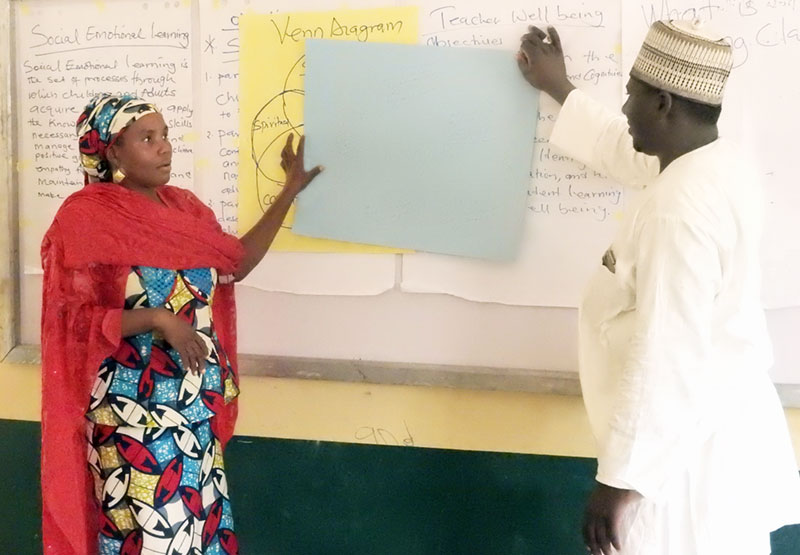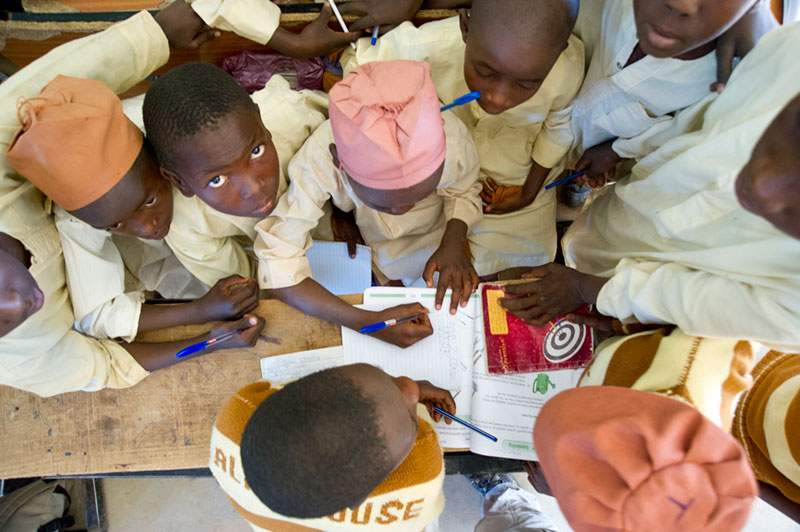[vc_row][vc_column][vc_column_text]
7,100 Nigerian teachers learn how to support students – and themselves – after trauma
By Chima Onwe
[/vc_column_text][/vc_column][/vc_row][vc_row][vc_column width=”2/3″][vc_column_text]BIU, Nigeria — More than 7,100 primary school teachers in Nigeria are returning to their classrooms better equipped to help their students – and themselves – succeed in the wake of the conflict by violent extremists.
In five Local Government Areas of the northeastern state of Borno, a total of 7,169 primary school teachers participated in four-day training sessions, aimed at giving them tools to more effectively reach their students.
The training covered topics on psychosocial counseling, trauma healing, creating a child-friendly learning environment and incorporating social and emotional learning into curricula.
In a region where countless children have been affected by Boko Haram, teachers need these tools to support their students both academically and emotionally.
“In my 10 years plus as a teacher, I have never attended such kind of training,” said Shehu Abdullahi, a teacher in the community of Biu. “I wouldn’t have been able to pay for this training – it cannot be quantified in monetary value. I am eager to go back and practice what I learned in the classroom.”
The trainings were conducted throughout May and June by Nigeria Education Crisis Response – a project funded by the U.S. Agency for International Development and implemented by Creative Associates International in partnership with the International Rescue Committee and more than 40 Nigerian organizations.
The project aims to expand access to quality education for out-of-school and internally displaced children and youth 6 to 17 by establishing non-formal learning centers that offer accelerated education programs to put students back on a path to consistent school attendance. Across the five northeastern states where it operates, the project also provides support to formal schools.
The state of Borno is at the epicenter of the conflict with Boko Haram. Education institutions have been especially hard-hit. In coordination with the Borno government, the project set out to reach as many formal school teachers as possible with training to help the state rebuild its education systems.
“The training program is coming at the right time and will go a long way in assisting our efforts toward fixing the education sector in Borno state,” said Borno’s Deputy Governor Alhaji Usman Mamman Durkwa as the training began.

Teaching resilience to overcome trauma
Boko Haram has disrupted and displaced millions of people across the region, and its attacks frequently target schools.
In addition to students falling behind on studies due to displacement or closed schools, those returning to the classroom may have endured loss and emotional trauma that can negatively impact their ability to learn.
Using the project’s “Healing Classrooms” approach, the training instructed teachers on how to strengthen students’ sense of control, sense of belonging and safety, feelings of self-worth, relationships with peers and adults, and learning engagement to improve overall well-being.
It also focused on how to infuse social and emotional learning in lesson work – guiding students on how to manage emotions, set goals, show empathy for others and make responsible decisions.
“The teaching methodology we were exposed to in the four days of this training is the fastest way to bring our pupils to speed with the insurgency we have experienced,” said Biu teacher Habiba Audu. “I will apply what I have learned to assist the pupils regain what they have lost.”
The training also gave teachers a chance to reflect on their own needs – more than 300 Borno teachers have been killed by Boko Haram. A baseline study in Borno found that more than 93 percent of teachers experienced trauma and subsequent emotional issues. Many had also been forced out of work, some for years at a time.
A portion of the training was dedicated to allowing teachers to think about how their own well-being and behavior can affect their students.
“We are grateful to the USAID Education Crisis Response Project for not only introducing this training to improve the emotional well-being and pedagogical skills of many of our formal teachers, but also for bringing in many of our out-of-school children into the educational system through the non-formal approach and alternative educational opportunity,” said Waziri Umar Ngurno, Secretary of the Borno State Universal Basic Education Board.

Network of training
The effort to reach thousands of teachers started small: A 28-person group drawn from the project, the government and universities first came together to develop training manuals.
Fifteen national trainers approved the manuals, and from there developed a training guide.
The guide was used to instruct more than 100 “master trainers” on how to facilitate the larger trainings for primary school teachers. That group then led the four-day sessions in five different Local Government Areas: Biu, Jere, Kaga, Konduga and Maiduguri.
Veteran teachers said that such a training was a new experience for them – in its sheer size, organization, and content.
“This training is the first of its kind, it is one year’s training wrapped in four days,” said Mohammed Madu Galadima, a teacher in Biu. “I have learned teaching methods that I can apply to teach my pupils, especially those that are traumatized.”[/vc_column_text][/vc_column][vc_column width=”1/12″][/vc_column][vc_column width=”1/4″][vc_widget_sidebar sidebar_id=”sidebar-primary”][/vc_column][/vc_row]